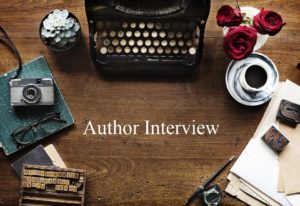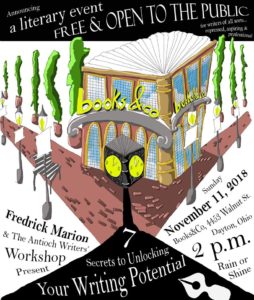An Interview with Fredrick Marion
 Fredrick Marion is the person you’d want by your side if the zombie apocalypse ever occurred: he’s imaginative, resourceful, knows his way around computers and the outdoors, will share his food with you, and is the type of person who just “gets things done.” (Those zombies would never stand a chance against him; I’m sure of it.) I can’t remember when I first met Fred–most likely at an Antioch Writers’ Workshop event–but along with being all of the above, he’s also a Dayton legend: people know who he is, and if you don’t, you should. He is the founder of DaytonLit.com and writes a weekly email newsletter, and he’s currently working on a middle grade novel. Fred will be speaking at a free seminar at Books&Co. at the Greene on Sunday, November 11, at 2 p.m., where he will reveal his “7 Secrets to Unlocking Your Writing Potential.” I’m so thankful Fred took the time to answer these questions.
Fredrick Marion is the person you’d want by your side if the zombie apocalypse ever occurred: he’s imaginative, resourceful, knows his way around computers and the outdoors, will share his food with you, and is the type of person who just “gets things done.” (Those zombies would never stand a chance against him; I’m sure of it.) I can’t remember when I first met Fred–most likely at an Antioch Writers’ Workshop event–but along with being all of the above, he’s also a Dayton legend: people know who he is, and if you don’t, you should. He is the founder of DaytonLit.com and writes a weekly email newsletter, and he’s currently working on a middle grade novel. Fred will be speaking at a free seminar at Books&Co. at the Greene on Sunday, November 11, at 2 p.m., where he will reveal his “7 Secrets to Unlocking Your Writing Potential.” I’m so thankful Fred took the time to answer these questions.
Christina: The Very Strange and Very Secret Trashcan Club features a group of orphans with superpowers. What is your superpower? If you could have a different superpower, what would it be and why?
Fredrick: Ask me what I’m terrible at, and I could go on for hours. Ask me about my superpowers, and I clam up. If I had to name one superpower, though, I’d say I have a high capacity for focus . . . With everything from editing/writing to teaching myself web and graphic design, I can sit in a chair for hours and tune out the world. I either decide something’s worth doing (and I devote every ounce of attention to it) or I don’t touch it at all.
If I could pick a different superpower, I’d obviously pick flying. Short of that, give me perfect recall.
Christina: You’ve held a long list of jobs over the years. How have these jobs helped your creative process?
Fredrick: Writers are empathy machines. You’ve got to be able to put yourself into other people’s shoes, and I’ve been lucky to work with a wide range of people. From dishwashers to CEOs, I’ve gotten to absorb how similar people are in some ways and how dramatically different. There is no better job in the world than being a reporter, though. It’s like you’ve got a license to probe fascinating people’s minds . . . and you get paid to do it.
Christina: Your website features a number of quotes, one of which is credited to Oliver Wendell Holmes: “The average person goes to his grave with his music still in him.” What do you think is the best way to make sure that a person doesn’t let that happen?
Fredrick: First, you’ve got to survive your early 20s (I’m lucky I made it through). Then, you’ve got to start getting selective. You’ve got to block out aspects of the world, so you can turn inward. It’s the only way you can feel that tug (what Holmes calls your music). It might be the urge to make chainsaw sculptures or to open a food truck. Whatever it is, it’s your thing, and it’s not going to be easy. It requires cleaving off part of your old life (some of the activities and beliefs you inherited from your family and friends), so you can make a different life, one that’s truly yours.
If you want to die with your music stuck inside, there’s a pretty simple recipe: just be afraid to change. Hold on to the past and keep everything exactly the same. Do what’s expected of you. Duck under challenges — don’t rise up to meet them.
Christina: Locally, you’re known for the wonderful newsletter you produce out of DaytonLit.com. How did this newsletter come to exist? What do you hope it accomplishes?
Fredrick: First of all, thank you for the kind words. I’m sure you know this, but non-writers probably have no idea how much it can mean to hear that something you wrote had a positive impact on someone else.
I created DaytonLit largely because it’s something I wished was already in the world. I wanted a calendar I could glance at that showed me upcoming literary events. So the email newsletter is one part events listings, and a second more personal part where I share what’s going on in my life or what I’m thinking about.
In my secret, grand vision, the email is doing two things: 1) it’s growing Dayton’s arts scene; and 2) it’s helping people who are stuck somewhere on their creative journeys get unstuck. I’ve had a couple people tell me they’ve started or finished projects after reading some of my emails. That means the world to me. Even thinking about it now moves me.
I was stuck for too long — living other people’s lives — and I don’t want that for anyone. If more people were truly living the way they wanted to be living and doing what they wanted to be doing, the world would be a much happier place.
Christina: Between your time as a journalist and the newsletter you write, you’ve interviewed a multitude of folks. What’s it like being on the other side of the interview?
Fredrick: It’s a rush. I feel like I could talk forever. I’m literally holding myself back, and I think that is a reminder to myself that I’m on the right path. Whenever I interview people who are really passionate about what they’re doing, it’s obvious. It comes seeping out of their pores. It’s hard to get them to shut up sometimes . . . so, I’ll stop now.
Christina: Like you, I’m an INFJ. What about that personality type helps you as a writer? What about it hurts you?
Fredrick: I can totally tell you’re an INFJ. INFJs are empathy machines. We try to see past what people are saying and understand why they’re saying it. I spend an inordinate amount of time thinking about stuff like that. Is there a better preoccupation for a writer to have? Creating characters is like putting on someone else’s dirty clothes and sitting in his favorite recliner. You’ve got to crawl into his skin.
There are plenty of bad things about being an INFJ, too. I used to be overly sensitive to conflict and negative feedback. That can generate the sort of fear that cripples writers. I’ve had to learn to re-frame negative feedback — to look for ways it can make me better. It’s a crucial step for anyone: looking at everything, no matter how bad, as a learning opportunity.
Christina: Coffee and gum seem to play significant roles in your life. If you couldn’t drink coffee or chew gum again, how would that impact your life?
Fredrick: I’m sure I’d be a mess. Maybe I’d start smoking again. Or at least chew onion grass or wheat stalks. Either that or I’d buy a Gandalf-style pipe and puff on it with nothing inside. Maybe I’ll start doing that anyway. It just sounds like a cool idea.

Thanks to Fredrick for agreeing to this interview! If you know of an author who’d like to be featured in an interview (or you are an author who would like to be featured), feel free to leave a comment or email me via my contact page.
